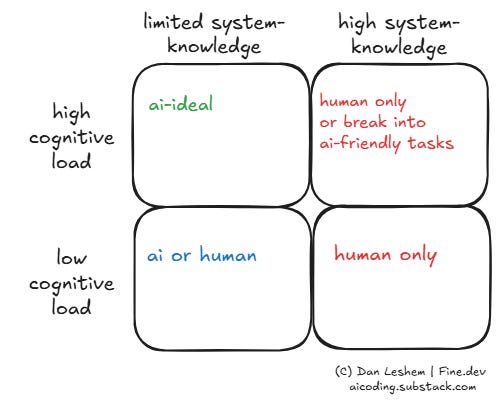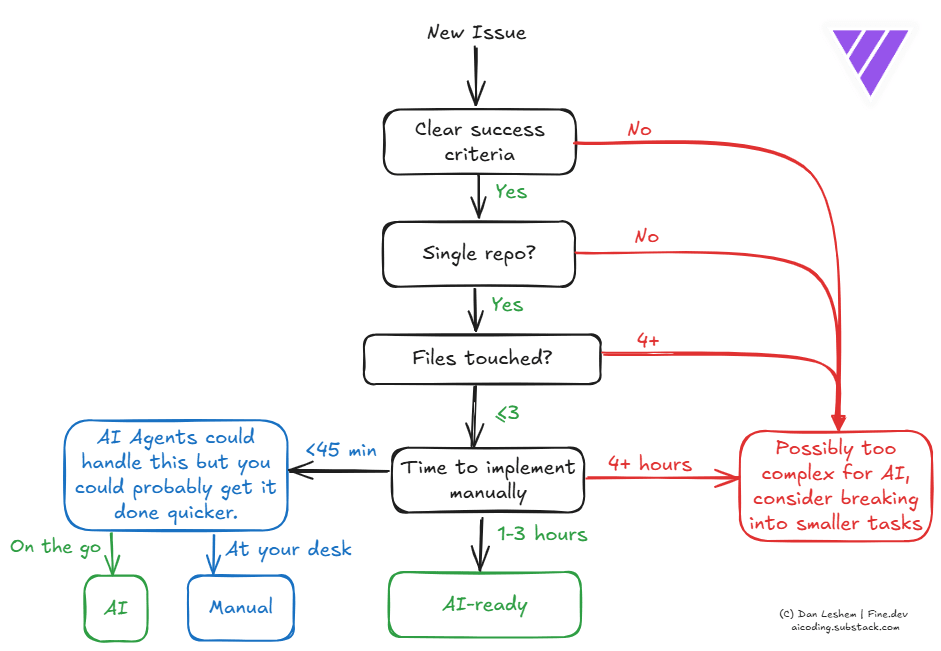AI Coding Notes #1: AI-Ready Tasks
What kind of issues should you delegate to your AI coding agent?
🔍 This Week's Key Learning
As a startup CTO working with a small team, I've learned that the secret to effective AI usage isn't to give it our hardest problems, but rather strategically offloading the right tasks. Using AI for most complex problems is a mistake.
Our success rate with AI agents jumped by 300% when we started assigning them what we call "low-surface context tasks" – issues that touch 3 or fewer files and have clear success criteria.
We’ve started managing a dedicated backlog for AI. Issues with limited scope, low-surface context and bounded system knowledge are added to the AI backlog.
This includes:
All minor bugs
UI tweaks
Chore tasks (e.g. adding a proper error handling)
Other issues where the path to resolution is clear and straightforward.
Rather than:
Replacing the auth provider
Working on huge refactors
Making significant changes to core features
Debugging a memory leak
This way, all “ai-ready” tasks are grouped together. When we have the time, we can offload a bunch of them to our AI agent to execute in parallel.
We’re also realistic about tasks with a low-cognitive load often being easier and quicker to do yourself. If there’s something urgent and I’m rushing or on the go, I may delegate it to an Agent from my mobile, but if I’m at my desk, already in the IDE, I’m more likely to get it done manually and move on.
💡 AI Coding Tip of the Week
If you're using Linear (like most startups I know), add an "ai-ready" label with these criteria:
Touches ≤ 3 files
Clear acceptance criteria
Estimated at < 3 hours
Single repository
No Gotchas
🎁 This Week's AI Coding Goodie
If you use Linear, I’ve created a simple Linear AI Triage tool script for you! It automatically scores your Linear issues for AI suitability and helps you identify the perfect tasks to delegate.
Check it out on GitHub: LinearAI Triage Tool
This is the prompt I built it with:
Create a script in Python that triage issues in Linear that are ready for AI using OpenAI LLM.
The script pulls issues in status “Backlog / Todo”
For every issue:
Create a formatted issue that includes the issue title, description and comments
Make an API request to OpenAI / GPT4o model, prompting the AI to analyze the issue and advice if the issue can be delegated to AI, by the following criteria:
The issue is minor and well defined
The issue is likely to involve no more than 3 files in the repository
The issue seems to be limited in scope, with limited system knowledge
The issue is estimated to be < 3 hours
The OpenAI API should respond with a JSON response {“ai_ready”: “true/false”}
Parse the Open AI API response, and if the “ai_ready” is true, add a label “ai-ready” to the issue on Linear.
Make sure all relevant API keys are taken from environment variables
🔮 What's Next
Next week I’m going to focus on “How to review your AI’s work”, which I think it’s a critical skill for AI developers. If you have any tips or examples you’d like to share, please send me a DM on Twitter or LinkedIn.
---
*Found this useful? Share it with your team and subscribe for weekly insights on practical AI coding tips.*



